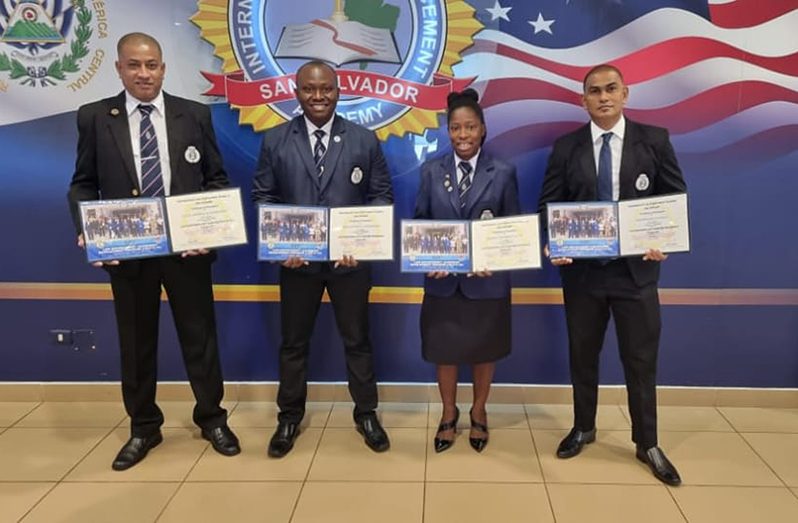FOUR senior police officers of the Guyana Police Force (GPF) have successfully completed an Executive Law Enforcement Leadership course in El Salvador.
The course was conducted in San Salvador, the capital of El Salvador, at the ILEA Training Academy, during the period July 11 to July 29, 2022.
El Salvador, Uruguay, Belize, Jamaica, Trinidad and Tobago, and Guyana were among the countries represented by law enforcement officers.
The Guyanese beneficiaries of the programme were Head of the Special Organised Crime Unit (SOCU), Assistant Commissioner Fazil Karimbaksh; Superintendent Krishnadat Ramana, also attached to the Special Organised
Crime Unit; Officer in Charge of Immigration at the Cheddi Jagan International Airport, Timerhi, Troy Benn, and Shift Commander of Immigration at the Cheddi Jagan International Airport, Timehri, Assistant Superintendent Rodella Glen.
The objective of the course was to teach successful leadership techniques such as fostering change to meet the challenges of running a law enforcement agency in the 21st century.
The programme was focused on some key areas, which included leading change, leadership concepts, ethics, and moral behaviour, understanding human behaviour, wellness in a law enforcement culture, belief system and motivators, emotional intelligence and leadership, and leadership in crisis situations.
Emphasis was placed on behavioural style analysis and values based on observable human behaviour and recognising “basic needs” that motivate, create, and support a positive working climate.
Participants were taught how to recognise and utilise behavioural style characteristics, value paradigms, and leadership flexibility models for strategically developing human resources.
As part of the course, participants were also introduced to problem-solving models and exercises used to identify and formulate strategies to address operational and organisational issues in crisis situations.
The officers extended gratitude to the Guyana Police Force’s administration for the opportunity to attend the training and posited that learning did take place and knowledge was therefore acquired. They indicated that such knowledge made them better equipped to lead the ranks under their charge to be more effective and efficient in the execution of their duties.





.jpg)








